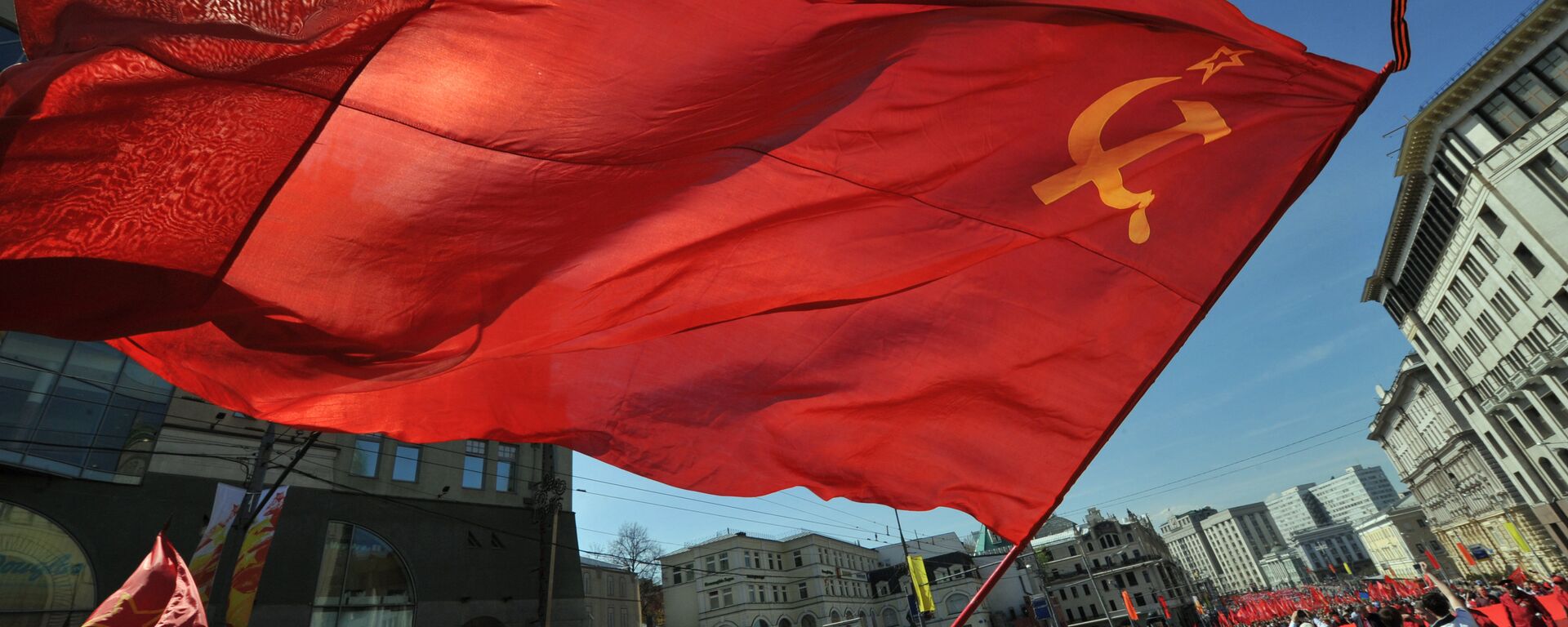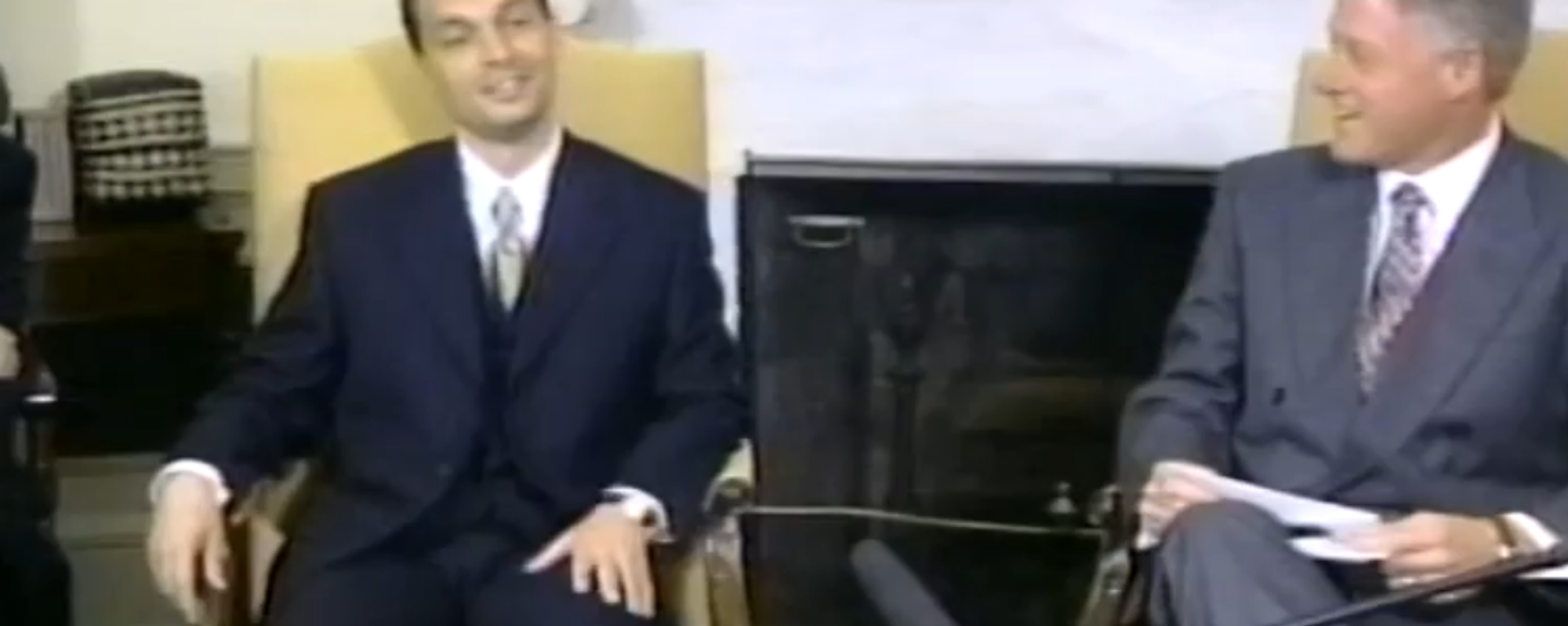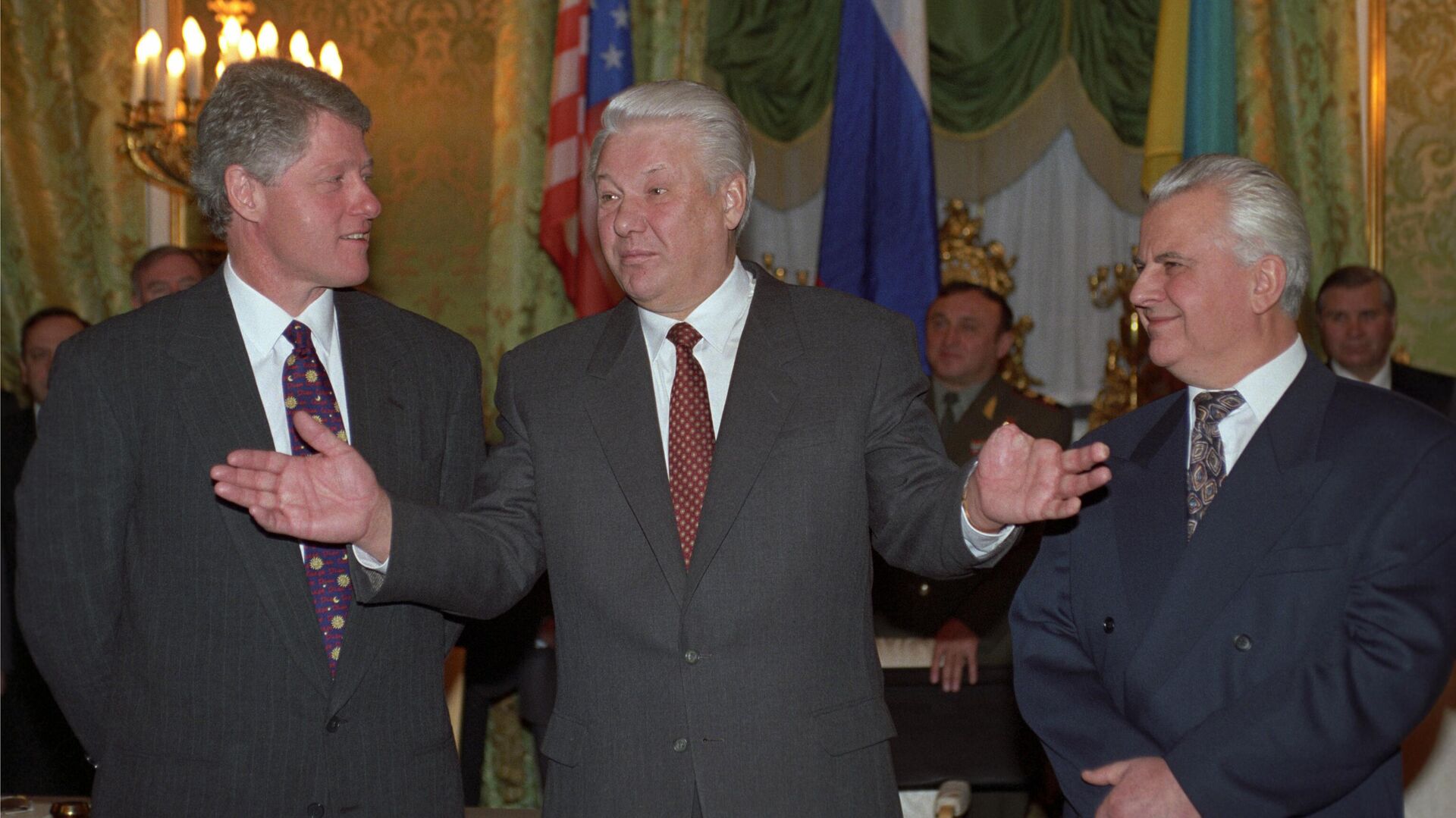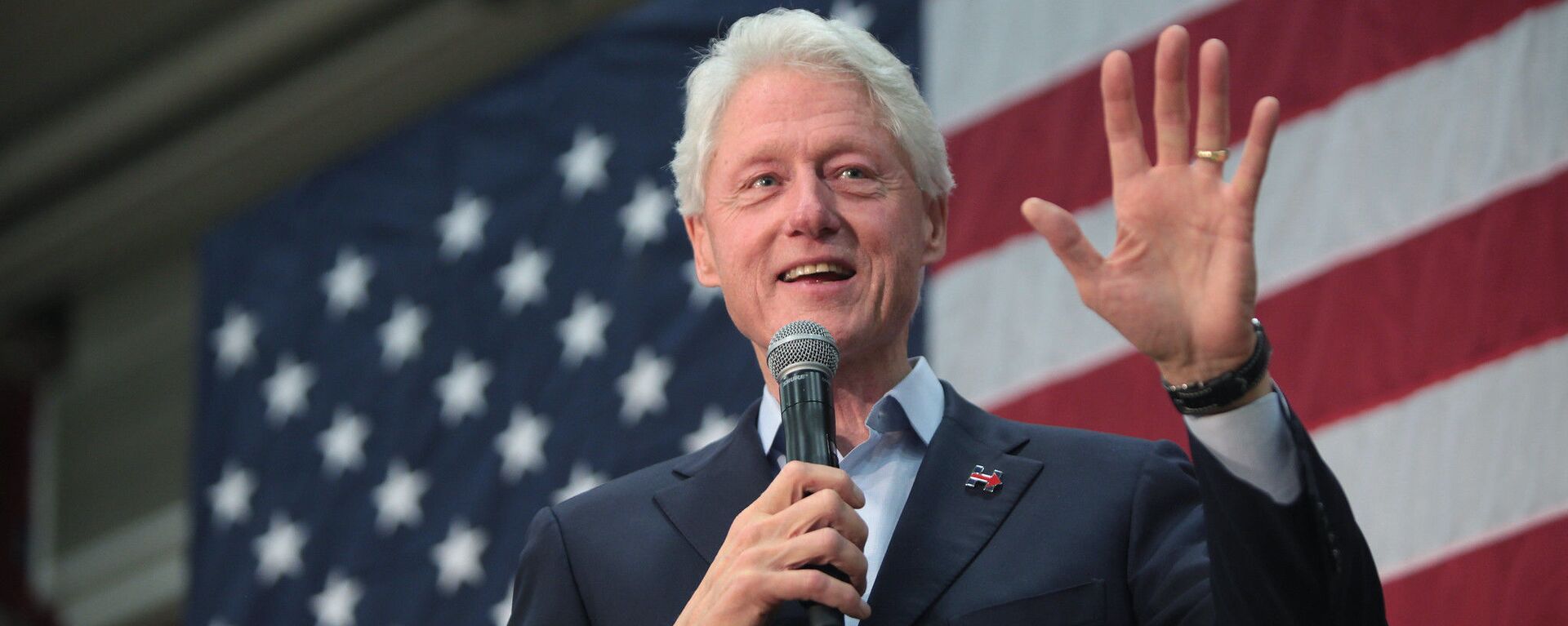https://sputnikglobe.com/20230405/bill-clinton-regrets-stripping-ukraine-of-nukes-but-not-nato-expansion-which-sparked-a-proxy-war-1109169000.html
Bill Clinton Regrets Stripping Ukraine of Nukes, But Not NATO Expansion Which Sparked a Proxy War
Bill Clinton Regrets Stripping Ukraine of Nukes, But Not NATO Expansion Which Sparked a Proxy War
Sputnik International
The Clinton administration oversaw the first post-Cold War wave of NATO’s expansion in the 1990s, announcing the plans two years after its predecessors made a firm commitment to Moscow not to expand “one inch east” of a reunified Germany.
2023-04-05T16:13+0000
2023-04-05T16:13+0000
2023-07-31T16:51+0000
world
bill clinton
nato
expansion
budapest memorandum
nuclear weapons
https://cdn1.img.sputnikglobe.com/img/07e7/01/0e/1106317352_0:161:3071:1888_1920x0_80_0_0_6884657225f6c66e80d53159d7287289.jpg
Former US President Bill Clinton has expressed pangs of regret over the diplomatic pressure he put on Kiev in the 1990s to sign a treaty which prompted Ukraine to give up its massive Soviet-era stockpile of nukes.“Well I knew that President Putin did not support the agreement President Yeltsin made,” Clinton said in an interview with Irish media, referencing the 1994 Budapest Agreement.Accusing Putin of “breaking” the treaty by reincorporating Crimea into Russia after the US-backed coup in Kiev in 2014, Clinton said he felt awful about how events turned out.The former president encouraged the US and Europe to “continue to support” Ukraine in the ongoing NATO-Russia proxy war, and said if there is to be peace, it has to be on Kiev’s terms. “There may come a time when the Ukrainian government believes that they can think of a peace agreement they could live with, but I don’t think the rest of us should cut and run on them,” Clinton said.The comments are the second time in a year that the former US president has chimed in on how his administration’s policy helped lead to the current crisis in Ukraine, and in Russia-US relations. Last April, Clinton boasted that he had made the “correct” decision to expand NATO in the 1990s, saying his concerns at the time were “not about a Russian return to communism, but about a return to ultranationalism, replacing democracy and cooperation with aspirations to empire, like Peter the Great and Catherine the Great.”Fateful DecisionNATO lost its raison d’etre in 1991 with the collapse of the Soviet Union and the dissolution of the Warsaw Pact – the Moscow-led alliance established in 1955 to counter the Western military bloc.In a 1997 op-ed in the New York Times, George Kennan, author of the original 1940s ‘containment doctrine’ against the USSR, warned that the alliance’s eastward push would constitute “the most fateful error of American policy in the entire post-Cold War era,” undermine trust with Russia, and “impel Russian foreign policy in directions not to our liking.”Senior Clinton officials also expressed concerns, with then Joints Chiefs Chairman John Shalikashvili warning before expansion began that Moscow was “not mature enough to understand expanded membership,” and that Washington shouldn’t “risk Russian perceptions of NATO expansion at Russia’s expense.”The Clinton administration first publicly announced the possibility of NATO expansion in the summer of 1993 – just two years after James Baker, secretary of state to former president George H.W. Bush, assured then-Soviet leader Mikhail Gorbachev that if Moscow agreed to the unification of East and West Germany, the Western bloc would commit not to expand “one inch eastward” beyond the boundaries of the former German Democratic Republic.Ukraine’s NukesAfter the USSR disappeared, Ukraine was left with over 1,700 nuclear warheads, 200+ intercontinental ballistic missiles and 38 heavy nuclear bombers, making the country the world’s third most powerful nuclear weapons power overnight. However, the launch codes for these weapons were never in Kiev’s hands, and were controlled by President Yeltsin in Moscow until their transfer to Russian side, and subsequent destruction.The 1994 Budapest Agreement has been brought up repeatedly in Western international relations circles over the past year, with the US and its allies accusing Moscow of violating the terms of the treaty and its obligation that signatories “refrain from the threat or use of force against the territorial integrity or political independence of Ukraine.” Others have dismissed these allegations, pointing out that Ukraine had committed to rejecting nuclear weapons in its 1990 declaration of state sovereignty, and noting that allusions to Ukrainian neutrality were systematically undermined by the US and EU-backed color revolutions in the country, and the pro-Western government’s decision to amend the constitution to plot a “strategic course” to join the EU and NATO in 2018.
https://sputnikglobe.com/20220409/ex-president-bill-clinton-says-he-supported-correct-albeit-consequential-decision-to-expand-nato-1094611176.html
https://sputnikglobe.com/20221231/scholar-ussr-would-still-exist-today-if-not-for-gorbachevs-failed-reforms-1105956291.html
https://sputnikglobe.com/20221008/clinton-tried-to-push-hungarys-orban-into-invading-yugoslavia-during-1999-nato-war-vucic-reveals-1101637410.html
Sputnik International
feedback@sputniknews.com
+74956456601
MIA „Rossiya Segodnya“
2023
News
en_EN
Sputnik International
feedback@sputniknews.com
+74956456601
MIA „Rossiya Segodnya“
Sputnik International
feedback@sputniknews.com
+74956456601
MIA „Rossiya Segodnya“
nuclear weapons, nukes, budapest memorandum, bill clinton, nato, expansion, russia-us tensions
nuclear weapons, nukes, budapest memorandum, bill clinton, nato, expansion, russia-us tensions
Bill Clinton Regrets Stripping Ukraine of Nukes, But Not NATO Expansion Which Sparked a Proxy War
16:13 GMT 05.04.2023 (Updated: 16:51 GMT 31.07.2023) The Clinton administration oversaw the first post-Cold War wave of NATO’s expansion in the 1990s, announcing the plans two years after its predecessors made a firm commitment to Moscow not to expand “one inch east” of a reunified Germany.
Former US President Bill Clinton has expressed pangs of regret over the diplomatic pressure he put on Kiev in the 1990s to sign a treaty which prompted Ukraine to give up its massive Soviet-era stockpile of nukes.
“Well I knew that President Putin did not support the agreement President Yeltsin made,” Clinton
said in an interview with Irish media, referencing the 1994 Budapest Agreement.
Accusing Putin of “breaking” the treaty by reincorporating Crimea into Russia after the US-backed coup in Kiev in 2014, Clinton said he felt awful about how events turned out.
“I feel terrible about it because Ukraine is a very important country and I feel a personal stake because I got them to agree to give up their nuclear weapons and none of them believe that Russia would have pulled this stunt if Ukraine still had their weapons,” Clinton said.
The former president encouraged the US and Europe to “continue to support” Ukraine in the ongoing NATO-Russia proxy war, and said if there is to be peace, it has to be on Kiev’s terms. “There may come a time when the Ukrainian government believes that they can think of a peace agreement they could live with, but I don’t think the rest of us should cut and run on them,” Clinton said.
The comments are the second time in a year that the former US president has chimed in on how his administration’s policy helped lead to the current crisis in Ukraine, and in Russia-US relations. Last April, Clinton boasted that he had made the “correct” decision to expand NATO in the 1990s, saying his concerns at the time were “not about a Russian return to communism, but about a return to ultranationalism, replacing democracy and cooperation with aspirations to empire, like Peter the Great and Catherine the Great.”
NATO lost its raison d’etre in 1991 with the collapse of the Soviet Union and the dissolution of the Warsaw Pact – the Moscow-led alliance established in 1955 to counter the Western military bloc.
In a 1997 op-ed in the New York Times, George Kennan, author of the original 1940s ‘containment doctrine’ against the USSR,
warned that the alliance’s eastward push would constitute “the most fateful error of American policy in the entire post-Cold War era,” undermine trust with Russia, and “impel Russian foreign policy in directions not to our liking.”
Senior Clinton officials also expressed concerns, with then Joints Chiefs Chairman John Shalikashvili
warning before expansion began that Moscow was “not mature enough to understand expanded membership,” and that Washington shouldn’t “risk Russian perceptions of NATO expansion at Russia’s expense.”
The Clinton administration first publicly announced the possibility of NATO expansion in the summer of 1993 – just two years after James Baker, secretary of state to former president George H.W. Bush, assured then-Soviet leader Mikhail Gorbachev that if Moscow agreed to the unification of East and West Germany, the Western bloc would commit not to expand “one inch eastward” beyond the boundaries of the former German Democratic Republic.

31 December 2022, 13:50 GMT
After the USSR disappeared, Ukraine was left with over 1,700 nuclear warheads, 200+ intercontinental ballistic missiles and 38 heavy nuclear bombers, making the country the world’s third most powerful nuclear weapons power overnight. However, the launch codes for these weapons were never in Kiev’s hands, and were controlled by President Yeltsin in Moscow until their transfer to Russian side, and subsequent destruction.
The 1994 Budapest Agreement has been brought up repeatedly in Western international relations circles over the past year, with the US and its allies accusing Moscow of violating the terms of the treaty and its obligation that signatories “refrain from the threat or use of force against the territorial integrity or political independence of Ukraine.” Others have dismissed these allegations,
pointing out that Ukraine had committed to rejecting nuclear weapons in its 1990 declaration of state sovereignty, and noting that allusions to Ukrainian neutrality were systematically undermined by the US and EU-backed color revolutions in the country, and the pro-Western government’s decision to amend the constitution to plot a “strategic course” to join the EU and NATO in 2018.

8 October 2022, 12:27 GMT





